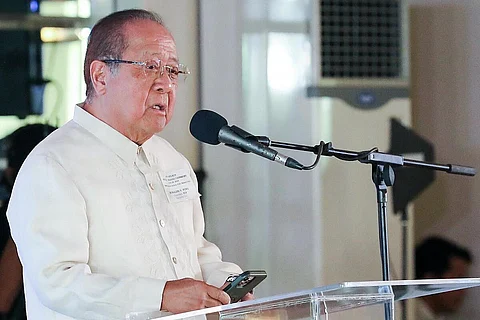
- NEWS
- the EDIT
- COMMENTARY
- BUSINESS
- LIFE
- SHOW
- ACTION
- GLOBAL GOALS
- SNAPS
- DYARYO TIRADA
- MORE

Prompted by the recent bickering between the House of Representatives and the Senate regarding the interpretation of “forthwith,” a House leader on Monday said it’s high time to finally amend certain provisions of the 38-year-old Constitution to correct such ambiguities.
In a privilege speech, Deputy Speaker Ronaldo Puno called for the convening of a constitutional convention (con-con) that would undertake a sweeping review and eventually propose amendments to the supreme law of the land to address its so-called vague language, which proponents claimed has resulted in different interpretations over the years.
“While the provisions of our Constitution are noble in aspiration, certain provisions are marked by ambiguity and procedural deficiency. These deficiencies do not merely complicate interpretation; they obstruct reform, hinder effective governance, and erode public trust,” the Antipolo lawmaker said.
“I do contend, with deep conviction, that the Filipino people deserve a Constitution that speaks plainly and very clearly,” Puno continued.
Con-con is one of the three methods provided by the Constitution itself to introduce amendments to the Charter, the two being through a constituent assembly or con-ass and a people’s initiative (PI).
Unlike the con-ass, where sitting lawmakers propose revisions, delegates in a con-con are elected by the people, who will be tasked with solely reviewing and proposing constitutional changes. This method, however, is more costly than the PI — deemed as the most democratic process to initiate changes in the Charter — since it will require an election of delegates and a nationwide plebiscite.
Under the PI, amendments to the Constitution will come directly from the public, though it’s limited only to minor specific changes and not a total revamp.
Puno suggested that it’s best to take the con-con route since it’s “the most prudent, transparent and participatory mechanism” to correct “textual deficiencies, reconcile contradictions, remove ambiguities, institutionalize much-needed reform, and ensure that the foundational law of the land meets the needs of a dynamic and democratic society.”
Additionally, he said it will ensure that the national interest will prevail over legislators’ personal interests.
“Conflict of interest would be avoided, broader representation guaranteed, and risk of political expediency is reduced,” Puno added.
Puno cited the highly contested impeachment case of Vice President Sara Duterte as the most recent example to urgently institute reforms in the Constitution.
To recall, the House and the Senate had traded barbs over the latter’s reluctance to swiftly start with the VP’s impeachment despite the Constitution stating that a trial shall proceed “forthwith.”
Paragraph 4, Section 3 of Article XI of the Constitution mandates the Senate to forthwith proceed with the trial after receiving a verified complaint filed by at least one-third of all the members of the House.
The interpretation, however, has sparked intense debate among constitutional law experts, seasoned lawyers, and even legislators due to its “vagueness.”
Retired Supreme Court Senior Associate Justice Adolfo Azcuna — one of the framers of the 1987 Constitution — had repeatedly stressed that forthwith means “without unreasonable delay.”
Puno argued that the said provision should have been a “procedural safeguard against delay,” but ended up a “source of deadlock and controversy.”
“This episode illustrates the far-reaching implications of imprecise constitutional terminology even a single ambiguous word can become the justification for legislative inaction, procedural manipulation, or worse, the loss of accountability itself,” Puno lamented.
“A Constitution that fails to provide clear, unambiguous guidance undermines its own purpose as the country’s fundamental law. When its wording is subject to multiple interpretations, the predictability of law dissolves, opening the door to legal confusion and arbitrary application,” he further explained.
Puno said this recent issue involving impeachment and the other instances of constitutional vagueness have “created loopholes, led to political crises and institutional paralysis, [and] undermine the rule of law.”
“As the supreme law of the land, the Constitution must speak with clarity and force; its provisions must be comprehensible not only to courts and legislators but to the citizens whose rights it enshrines,” he concluded.
Puno is the incumbent chairperson of the National Unity Party, the second dominant bloc in the House with 44 members, next to Lakas-CMD headed by Speaker Martin Romualdez.
Efforts for a Charter change have been religiously done by the House in past Congresses, but never hurdled the Senate due to several factors, such as concerns that it may be a veiled attempt by legislators to extend their term limits.
In the 19th Congress, the House passed Resolution of Both Houses 7, which sought to relax restrictions on foreign ownership in public services, education, and the advertising industry to lure more foreign investments into the country.
The counterpart measure, however, languished in the Senate.
Last month, Ako Bicol Rep. Alfredo Garbin Jr. revived the longstanding attempt to amend the Charter under RBH 1.
Much of its provisions mimic RBH 7, save for amending Article 1 or the national territory, to incorporate the 2016 arbitral ruling that granted the Philippines exclusive rights over the West Philippine Sea in the face of China’s baseless territorial claim in the entire area.
The resolution also aims to relax some of the restrictive economic provisions in the 38-year-old Charter and allow Congress to pass economic measures without the need for constitutional amendments.
A similar measure was filed by Senator Robin Padilla, who chairs the Senate constitutional amendments and revision of codes.
President Marcos Jr. initially dismissed the need for Cha-cha but eventually softened his stance on the proposal on the condition that revisions would be strictly limited to economic provisions.
